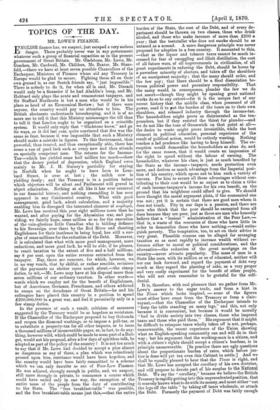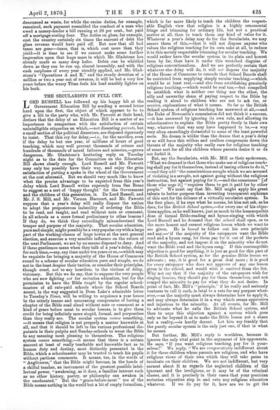TOPICS OF THE DAY.
MR. LOWE'S FINANCE. ENGLISH finance has, we suspect, just escaped a very serious danger. There probably never was in any government whatever such a group of financial capacities as in the present government of Great Britain. Mr. Gladstone, Mr. Lowe, Mr. Goschen, Mr. Cardwell, Mr. Childers, Mr. Baxter, Mr. Stans- feld,—there we have at least seven possible Chancellors of the Exchequer, Ministers of Finance whose aid any Treasury in Europe would be glad to secure. Fighting them all on their own ground is, as our Scotch friends say, " just impossible." There is nobody to do it, for when all is said, Mr. Disraeli would only be a financier if he had Aladdin's lamp, and Mr. Hubbard only plays the acute and remonstrant taxpayer, and Sir Stafford Northcote is but a man who would be in his place as head of an Economical Review ; but if there were anyone, the country would pay no attention to him. The British electorate understands housekeeping, and it is of no more use to tell it that this Ministry mismanages the till than to tell it that London ought to be organized on a scientific system. It would only reply that " Gladstone knew," and go its ways, as it did last year, quite convinced that five was the same as four, because it was impossible that such a Ministry should make a mistake in figures. To this Government, thus powerful, thus trusted, and thus exceptionally able, there has come a run of good luck such as every now and then attends on specially competent men. The returns for the Income- Tax—which has yielded some half million too much—show that the dreary period of depression, which England owes mainly to Mr. J. H. Gurney's partiality for staying in Norfolk when he ought to have been in Lom- bard Street, is over at last ; the milch cow is yielding freely ; and the Treasury is in a position before which objectors will be silent and Parliament will grovel in abject admiration. Nothing at all like it has ever occurred in our financial history, and nothing resembling it has ever appeared in any Continental country. What with good management, good luck, adroit calculation, and a majority enabling him to disregard the interested clamour of employe's, Mr. Lowe has received this year eight millions more than he wanted, and after paying for the Abyssinian war, and pro- viding, we faintly hope, some million or so for the execution of the vain-glorious little Canadian who is bidding defiance to his Sovereign over there by the Red River and shooting Englishmen for their insolence in being loyal, has still a sur- plus of some millions for the reduction of the Debt. Moreover, it is calculated that what with more good management, more reductions, and more good luck, he will be able, if he pleases, to remit taxation to the extent of five and a half millions, say 8 per cent. upon the entire revenue extracted from the taxpayer. Nay, there are rumours, for which, however, we, in no way vouch, that by skilful, or rather sensible, revisions of the payments no elector cares much about,—the stamp duties, to wit,—Mr. Lowe may have at his disposal more than seven millions of our ordinary taxation. In other words— words which we employ not for the benefit of Englishmen, but of Americans, Germans, Frenchmen, and others addicted to essays on the decadence of Great Britain—he and his colleagues have placed this country in a position to spend £200,000,000 in a great war, and feel it pecuniarily only in a few stamp duties.
In the presence of such a result, criticism of measures suggested by the Treasury would be as hopeless as resistance. If the Chancellor of the Exchequer proposed to buy Golconda and reopen the diamond washings, or to impose a poll-tax, or to substitute a property-tax for all other imposts, or to issue a thousand millions of inconvertible paper, or, in fact, to do any- thing, however wild, which could be made to seem part of a Bud- get, would not his proposal, after a few days of spiritless talk, be adopted as part of the policy of the country ? It is not too much to say that if Mr. Lowe had decided to accept a plan almost as dangerous as any of these, a plan which was relentlessly pressed upon him, resistance would have been hopeless, and the country would have been fairly committed to a scheme which we can only describe as one of Poor-Law Finance. He was adjured, strongly enough in public, and, we suspect, still more strongly in private, to commence a course which could have ended only in one way, the exemption of the entire mass of the people from the duty of contributing to the State. The "free breakfast-table" was possible, and the free breakfast-table means just this,—that the entire burden of the State, the cost of the Debt, and of every de- partment should be thrown on two classes, those who drink alcohol, and those who make incomes of more than £200 a year ; that the teetotaller who does not smoke should be as untaxed as a nomad. A more dangerous principle was never proposed for adoption in a free country. It amounted to this, —that as the liquor and tobacco taxes cannot be much in- creased for fear of smuggling and illicit distillation, the cost of all future wars, of all improvements in civilization, of all great experiments in reducing the Debt, should be borne by a powerless minority of electors, and taken off the shoulders of an omnipotent majority ; that the many should order, and the few pay ; that there should be a final dissociation be- tween political power and pecuniary responsibility. That the many would, in consequence, plunder the few we do not assert—though they might by opening great national works do so to any extent—for it is the unique fact of our recent history that the middle class, when possessed of all power, used it to put the burden of the taxes on to their own shoulders, and released industry through the income-tax. The householders might prove as disinterested as the ten- pounders, but if they resisted the thirst for plunder—and we do not like the tone of Greenwich on that point at all— the desire to waste might prove irresistible, while the best element in political education, personal experience of the result of political action, would be entirely wanting. Nothing teaches a lad prudence like having to keep himself. The ex- emption would demoralize the householders as alms do, and for the same reason, that it would create an impression of the right to spend without the labour of earning. The householder, whatever his class, is just as much benefited by the State as the income - taxpayer, needs protection even more, and derives as much advantage from the Imperial posi- tion of his country, which opens out to him such a variety of careers. For him to secure all these advantages without con- tributing to their cost would be as unjust as to claim a tithe of each income-taxpayer's income for his own benefit, on the ground that his neighbour could afford to give. We should have thought the moral argument plain, if the economical one was not ; yet it is certain that there are good men whom it does not touch. Pity in our days is a passion, and there are men who think that the poor should be exempted from all dues because they are poor, just as there are men who honestly believe that a "lenient " administration of the Poor Law,— that is, a waste of the resources of those who have little in order to demoralize those who have nothing,—would extin- guish poverty. The temptation, too, to act on their advice is very great. Plausible reasons can be alleged for arranging taxation so as most rapidly to increase wealth without re- ference either to moral or political considerations, and the alternative—the reduction of the great mortgage on the country—never attracts popularity. The mass of men in a State like ours, with its million or so of educated, neither will nor can look forward, and regard the payment of debt very much as they regard the planting of oaks, as a very proper and very costly experiment for the benefit of other people, who will not even remember to be grateful for the self- denial.
It is, therefore, with real pleasure that we gather from Mr. Lowe's answer to the sugar trade, and from a hint in the Times which looks inspired, — some of the figures must either have come from the Treasury or from a clair- voyant,—that the Chancellor of the Exchequer intends to "keep the table standing on many legs," and this, not only because it is convenient, but because it would be morally " bad to divide society into two classes, those who imposed taxes and those who paid them." His argument that it might be difficult to reimpose taxes wholly taken off is not, perhaps, unanswerable, the recent experience of the Union showing what an English-speaking community can and will do in that way ; but his argument that the working-man is a citizen, and with a citizen's rights should accept a citizen's burdens, is in principle unanswerable. [In practice there are ugly questions about the proportionate burden of rates, which before jus- tice is done will yet tax even this Cabinet to settle.] And we shall be equally pleased to hear that the Times is right, and that Mr. Lowe has accepted the corollary of his own doctrine, and will propose to devote part of his surplus to the National Debt. We say the "corollary," because we believe the British Treasury is rapidly getting into this unprecedented position, that it scarcely knows what to do with its money, and must either "cat the legs off the table " by taking off taxes wholesale, or attack the Debt. Formerly the payment of Debt was fairly enough denounced as waste, for while the excise duties, for example, remained, such payment resembled the conduct of a man who owed a money-lender a bill running at 20 per cent., but paid off a mortgage costing four. The duties on glass, for example, cost the country certainly six times the amount of debt the glass revenue would have paid off. But now that all bad taxes are gone—taxes, that is, which cost more than they yield—it is time to see if we cannot make some further impression upon that huge mass in which Mr. Gladstone has already made so many deep holes. Debts can be whittled down as they can be run up, almost insensibly, and with the cash surpluses of every year steadily applied, and Mr. Glad- stone's "Operations A and B," and the steady devotion of a million or two a year out of revenue, it will be but a very few years before the weary Titan feels his load sensibly lighter on his back.



































 Previous page
Previous page